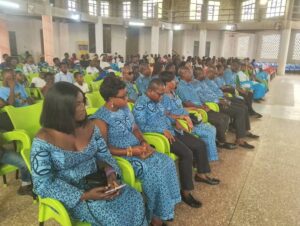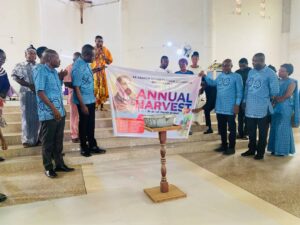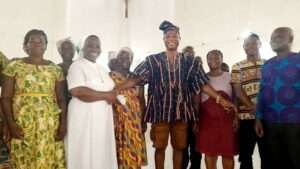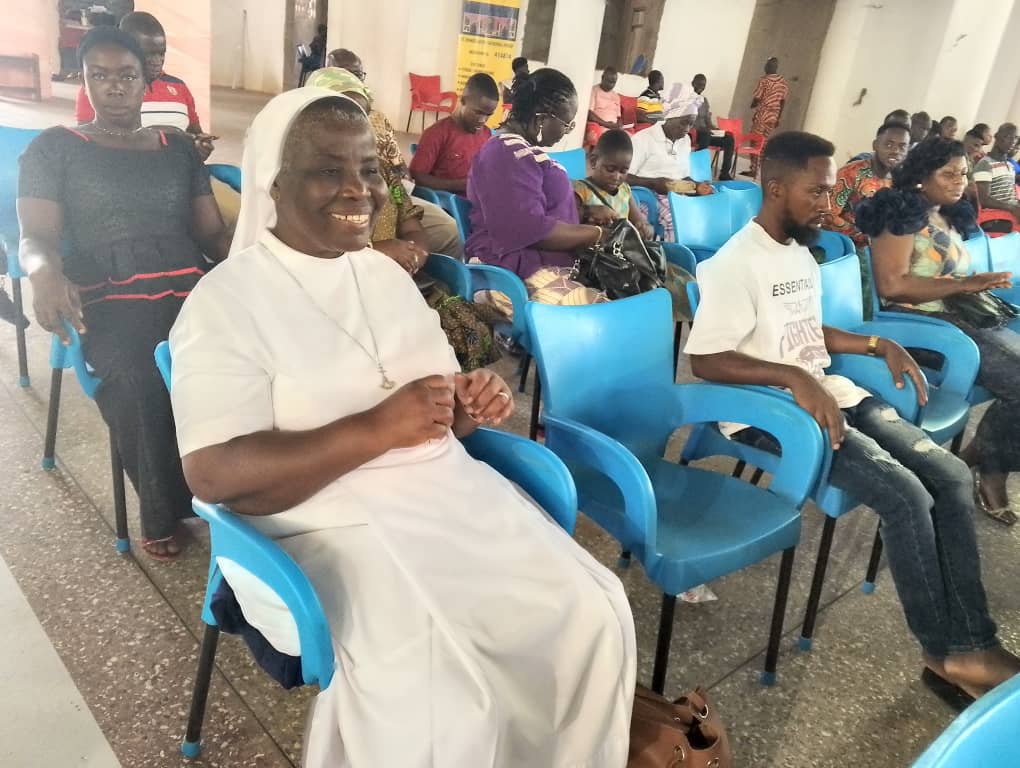The Most Rev. John Alphonse Asiedu, SVD, Bishop of the Apostolic Vicariate of Donkorkrom in Ghana’s Eastern Region, has enlightened the faithful of St. Francis Xavier Cathedral, Donkorkrom, on the actual meaning of the Parable of the Prodigal Son in Luke 15:1-3. 11-32.
In a Homily on the Fourth Sunday of Lent, the Local Ordinary elucidated that both sons of the father in the Parable were lost; “The younger son got lost when he travelled to a distant country, far away from home, while the elder son got lost staying home,” he pointed out.
He, however, noted a marked discrepancy between the two brothers, portraying the elder brother as the one who was lost.
He said that unlike the younger son who came back to his senses after suffering hunger and degradation, and decided to return home to his father, the elder son did return from the fields, but never got back home, despite repeated attempts by his father to bring him home. He rather chose to put up a ‘boring’ complaint: “All these years, I have slaved for you,” attesting to the fact that he saw fidelity to his father as slavery.
Likening the elder son to the Pharisees in the Gospel, who refused to have any relationship with the so-called sinners, Bishop Asiedu accentuated that the elder son was the ‘separated one’ because he refused to see his brother as a brother.

Unlike his father, who had mercy on his younger son and welcomed him back home, the elder son had no mercy; he was more than happy for his brother to remain lost, abandoned, and forsaken. His hard work had made him hard-hearted, the Bishop said.
He further drew parallels between the Pharisees whose name in the actual sense means “separated ones” who saw themselves as the righteous, who could not mingle with the unrighteous, as opposed to Jesus who saw both groups as children of the Father, and therefore, brothers and sisters to each other, and the elder son in the Parable who saw his brother as a failure and would not have anything to do with him, unlike the father who saw both of them as his sons, despite their limitations.
Appealing to the consciences of the faithful, his Lordship urged all to take an honest look at themselves to be able to identify parts of each of the three persons in them, saying that “there is the part of the father in us which has a genuine concern for those who are lost, and embrace the occasion that calls for celebrating with them.
There is the part of the younger son in us which wants to take everything we can and try everything we shouldn’t; we don’t listen to advice and wise counsel; we think and feel we know too much, but we know nothing. And there is the part of the elder brother which makes other people pay for our loveless fidelity. We are too proud and think we are always the best, second to none, in terms of being upright. We give the best advice, but they are only good for others, not for us,” he recounted, stressing that all three characters are within every Christian, competing to shape their lives.

The Bishop urged the faithful to learn from the example of the father, who throughout his younger son’s disappearance had not come to terms with it. He suffered what the prelate described as ‘Separation Anxiety’ which not only happens to children, who fear abandonment from their parents, but is in every adult, and expresses itself in the fear of “living in the absence of familiar love, of having no place to belong to, of being left at the lost-property office unlooked for and unclaimed”.
He further pointed out that the son’s leaving home and getting lost had not destroyed the relationship between father and son, as far as the father was concerned, because the latter was “always on the look-out, with his eyes always gazing the horizon for the return of his son”.
He added that the father’s love for the son gave him sure hope that his son would come back, and when he did return, that same love propelled him to take the initiative to meet him halfway, and organize a good party for his lost but found son.
“Let us pray in this holy season of Lent, that the father in each of us will be ready and willing to run for mercy,” he said, adding that there are a lot of people in our lives who have long been waiting for “our mercy, our love, our forgiveness and compassion and to be readmitted to our loving relationship” as spelt out in the First Reading.
“Let us demonstrate to all such persons the father’s kind-heartedness, which provides an insight into the love and compassion of our heavenly Father,” he implored.
Present at the March 30, 2025 Sunday Mass were Rev. Fr. Bernard Appiah Adjei, Cathedral Administrator of St. Francis Xavier, and Rev. Fr. Vincent Amuzu Asafo, SVD, Assistant Cathedral Administrator and Secretary to the Bishop, who concelebrated at the Mass, and Religious from the Parish.

Also present were the Knights and Ladies of Marshall from the St. Margaret Mary Parish, Dansoman, Archdiocese of Accra, who came on a visit and donated a Tabernacle to the Cathedral Church.
Other activities that took place during the Mass included a send-forth ceremony for Mr. Osei Owusu Wilberforce, a Parishioner, who had served the Cathedral for many years as Financial Committee Chairman and the Harvest Committee Chairman, and was leaving Donkorkrom for a new assignment.
There was also the launching of the Annual Harvest in support of the Cathedral Church project.
By Sr. Sylvie Lum Cho, MSHR (DEPSOCOM, Donkorkrom Apostolic Vicariate).



